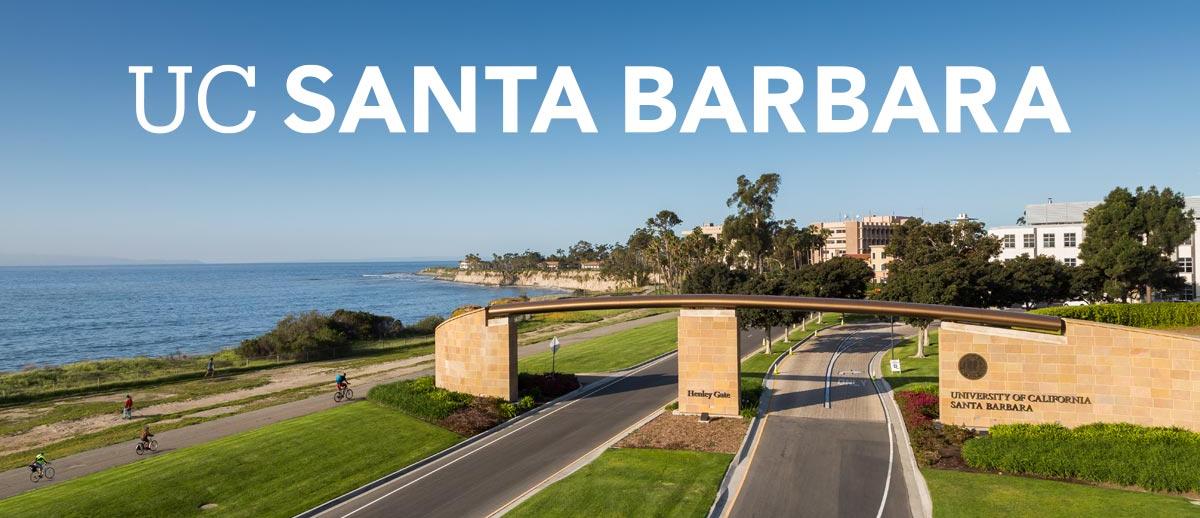Who are Latinx people? What does Latinidades signify? And what is the Global Latinidades Project?
Well, it’s complicated, very complicated, and controversial, with very many points of disagreement that one might call a general dissensus… and this is a good thing!
What’s in a Name: The Ongoing Search for a Paradigm
To begin, the population we currently refer to as Latinx is always evolving as we continue excavating pasts, performing the present, and anticipating the future. This dynamic is part of a long legacy of negotiation, adaptation, and transformation. Throughout many different eras, a proliferation of nomenclature has sought to give texture, and a name, to the unique populations that became part of the US by way of settler colonialism and accompanying apartheid, the transatlantic slave trade, and imperialist warfare, in addition to equally complex contact zone interactions, exchanges, and collaborations involving multiple generations of US-born or raised people of various Latin American heritages—who also have been complicit in settler colonialism, too! These terms include the early twentieth century moniker “Spanish American,” which sought to “whiten” the racialized category of “Mexican” in a highly problematic strategy by people of Latin American heritage to work around segregationist policies affecting them, without actually addressing segregation targeting Black people. The WWII era introduced the term “Mexican American,” with an emphasis on the American as a deliberate claim
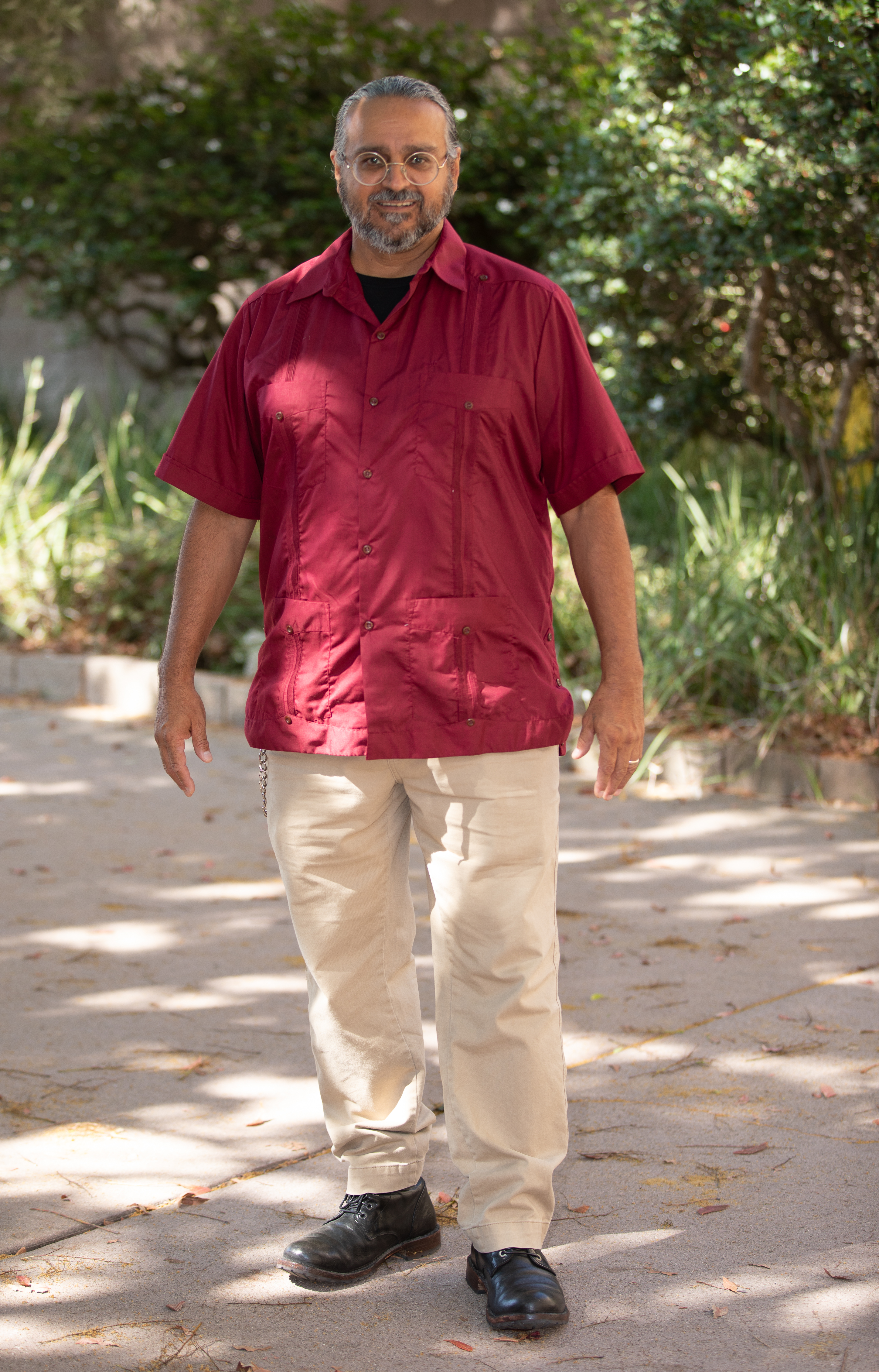
Ben V. Olguín, Director
The Global Latinidades Project
to inclusion and enfranchisement within the polis through organizational and legal interventions challenging formal segregation in a more comprehensive though still incomplete way. The terms “Chicana” and “Chicano,” and for Puerto Ricans “Boricua” (from “Borikén,” the Taíno indigenous name for island nation Spanish colonialists dubbed Puerto Rico), took oppositional postures that invoked indigenous heritages.
These terms coincided with social and political movements, particularly the Chicano Movement, and also Puerto Rican Nationalist Movement in the US mainland and intersecting independentista movement on the island. As with other racial minority “Power” movements of the era, these formations involved a multiplicity of ideological trajectories, from socialist to capitalist and everything between and beyond. In the 1980s and 1990s, these terms were partially displaced by “Hispanic,” favored by US demographers. It also must be noted that “Hispanic” was welcomed in many quarters of the broader Latinx communities as a Eurocentric alternative that de-emphasized racial difference in favor of greater inclusion and, they hoped, acceptance within US society.
Widespread use of “Hispanic,” and the growing prominence of Latinx middle and upper classes alongside the Latinx majority working class also signaled the very wide range of ideologies that exist within the Latinx community in general. The contemporaneous terms “Latina” and “Latino” emerged as an imperfect challenge to “Hispanic,” and its mainstream thrust, and also attempted to include a fuller range of Latin American-descent populations beyond the majority Chicanx population. Ironically, the terms “Latina” and “Latino” inadvertently are just as Eurocentric as the term they sought to replace, though prefaces such as “Afro-Latina” and “Afro-Latino” added some nuance.
Orthographic changes have punctuated this search for appropriate nomenclature and a comprehensive paradigm, with “Chicana/o” and “Latina/o,” as well as “Chican@” and “Latin@,” making important interventions into the heteropatriarchal dimensions of this long legacy by deliberately expanding the gendered sexualized referents through a deliberate refusal to use the male-gendered "o" suffix. The relatively recent advent of the “x” suffix for “Chicanx” and “Latinx” presents a profound intervention for the continued movement and transformation of how we understand, and live our lives, as complexly and simultaneously racialized, gendered, and sexualized humans. Indeed, the “x” signifies more than just the inclusion of queer, transgender, and non-binary people—an important, necessary, and long-overdue intervention in and of itself. The “x” suffix also productively scrutinizes the very notion of what it means to be human by signaling both the specific as well as the fluid continuities of our genders and our sexualities. Indeed, the “x” as an intersection, and also a signifier of the unquantifiable, insists on an expansive range of possibilities of gendered and sexualized identities—all fundamentally and inherently legitimate in their own right—without dismissing the categories of gender or sexuality that have been so necessary and productive for liberatory praxis.
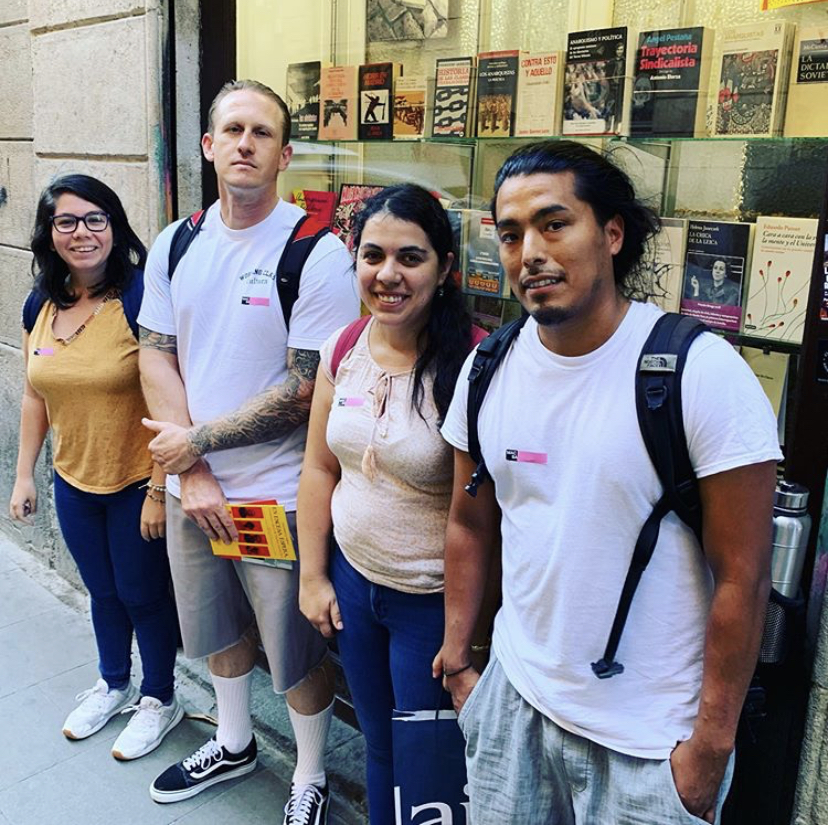
UCSB Graduate Students at the Decolonial Institute in Barcelona, 2019, Sponsored by The Global Latinidades Project
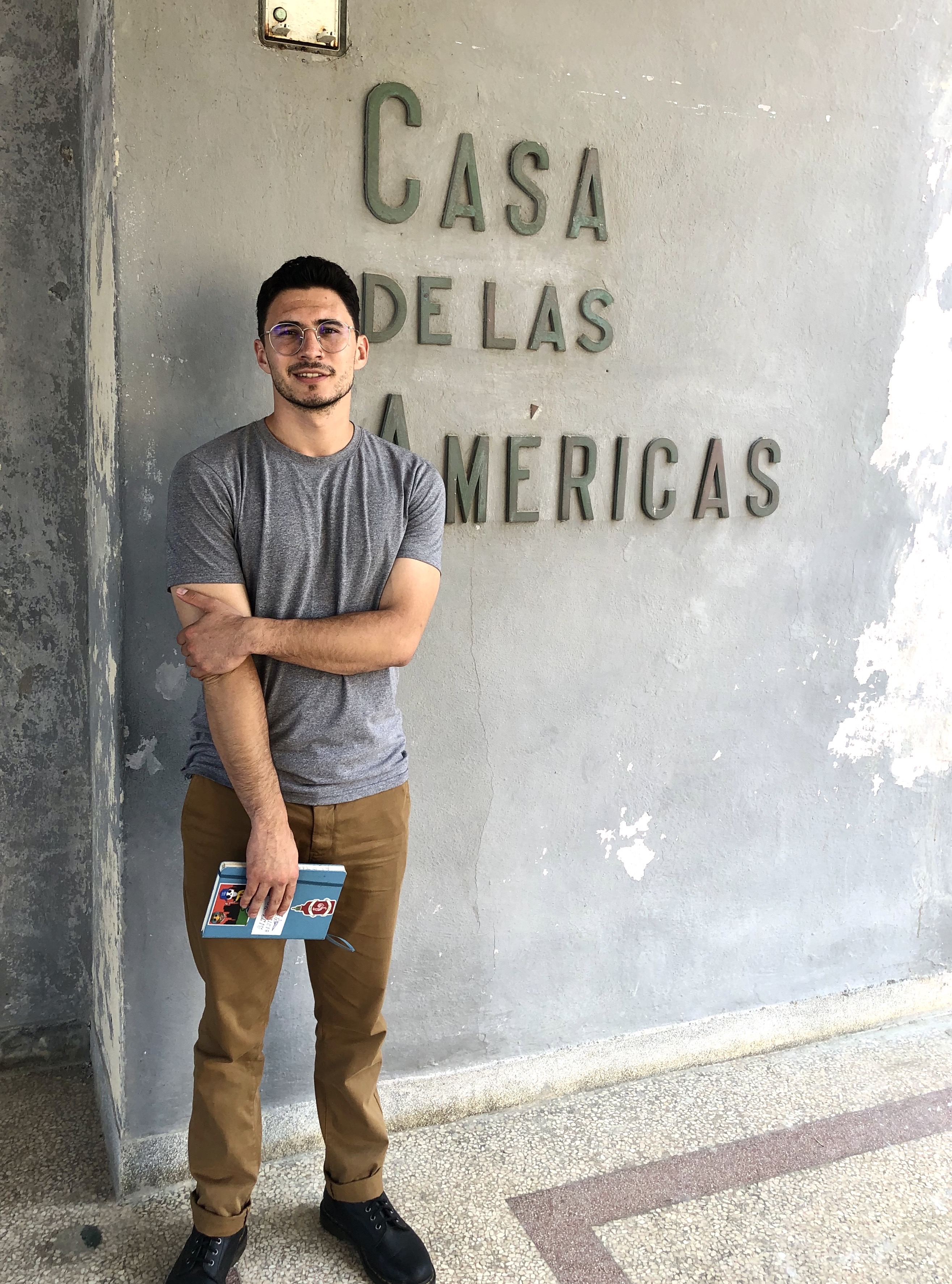
UCSB Graduate Student Alejandro Ollin Prado at the 5th International Colloquium on Latina/os in the US, La Casa de las Américas, Havana, Cuba, Summer 2019, Sponsored by The Global Latinidades Project
Significantly, this term also has limits for its potential to sublimate specificities in a person's self definition. Nonetheless, this meta-inquiry places Latinx Studies at the center of a huge, and indeed global, epistemological shift that is happening now. Yes, it is that important and profound, and Latinx people are at the center of it all!
Yet, the “x” has other limits, too. It is profoundly inadequate for signaling the racial dimensions of Latinx genealogies. The earlier and enduring term “Raza,” which translates both as "the people" and "the race," frequently is used to address this effacement. Moreover, “Raza” is gender neutral and also flexible enough to include racialized subjects who are not Latinx. This inclusiveness is necessary given the complex and convoluted legacy of transculturations of non-Latinx people into Latinx communities. A representative example of this legacy occurred in early and mid twentieth century Tampa Bay and Ybor City in Florida, in which the term “Latin” came to include African Americans, Spaniards, and Italians with primarily Black, mixed, and White Cuban Americans, many of whom became internationalist volunteers in revolutionary movements in the US, Cuba, and Spain. That is, "Latin" resonated as a signifier of race, but more importantly, signified a very clear and coherent revolutionary Marxist ideology. Ironically, this otherwise Eurocentric term enabled a more complex rendering of the racialized ideological possibilities for the population that today we call Latinx.
As part of this long and ongoing exploration of Latinx identities and ideologies, the field’s myriad populations continue challenging and expanding our very understanding of the range of possibilities that present themselves. This demographic evolution productively pressures the very field of Latinx Studies at a time when it has become increasingly institutionalized, solipsistic and celebratory, and also very petite bourgeois. Significantly, in addition to the field's ideologically ironic "militancy" for Latinx inclusion and advancement within the US polis, it has been very late in confronting other demographic changes. The emergence of new terms, such as “Central American Americans,” remind us of the constant demographic transformation of the Latinx population by longstanding and new migration streams from Central America, and also South America, that add to the demographically dominant Mexican and Caribbean heritage countries that have claimed the center of the US Latinx demographic. In a significant expansion of the field of Latinx Studies, the first Department of Central American and Transborder Studies was founded at the California State University at Northridge in 2015, with other institutions offering minors and majors in Central American Studies. Accordingly, the University of California at Los Angeles also recently has renamed their related unit as the Department of Chicana/o and Central American Studies. Longstanding variations and combinations such as the visionary former Center for Black and Puerto Rican Studies at Hunter College in the City University of New York system, remind us of the wide range of Latinx identities and intersections, and eclectic prisms and paradigms deployed to analyze Latinx realities. Indeed, the field is poised for another realignment and, perhaps even a paradigm shift, given the additional influx of new immigration streams from indigenous Mixtecs and Zapotecs from southern Mexico, whose own transculturations intersect with, but also challenge, the way indigeneity has been understood and deployed in Chicanx and broader Latinx Studies.
Latinx Means More Than Racial Identity
The matter of who is or is not Latinx, and what Latinx can be, is made all the more complicated by the long legacy of racial passing. Latinx intermarriage, so to speak, is as old as the birth of the heritage countries from which Latinx people emerge; this phenomenon has not abated in the US context following the US invasions, occupations, and annexations of Indigenous lands and Latinx heritage nations (which also were formed as settler colonial states on indigenous lands that themselves were anything but idyllic). Accordingly, there is a huge population of mixed-heritage (also referred to by some as interracial) Latinx people in the US. Some have always acknowledged their interracial and intercultural identities and heritage as their normal, while yet others were able to embrace the unacknowledged part of their heritage after transformative experiences in universities or other epiphanic contexts thanks in large part to interventions by Ethnic Studies students and faculty, and especially by community activists and artists.
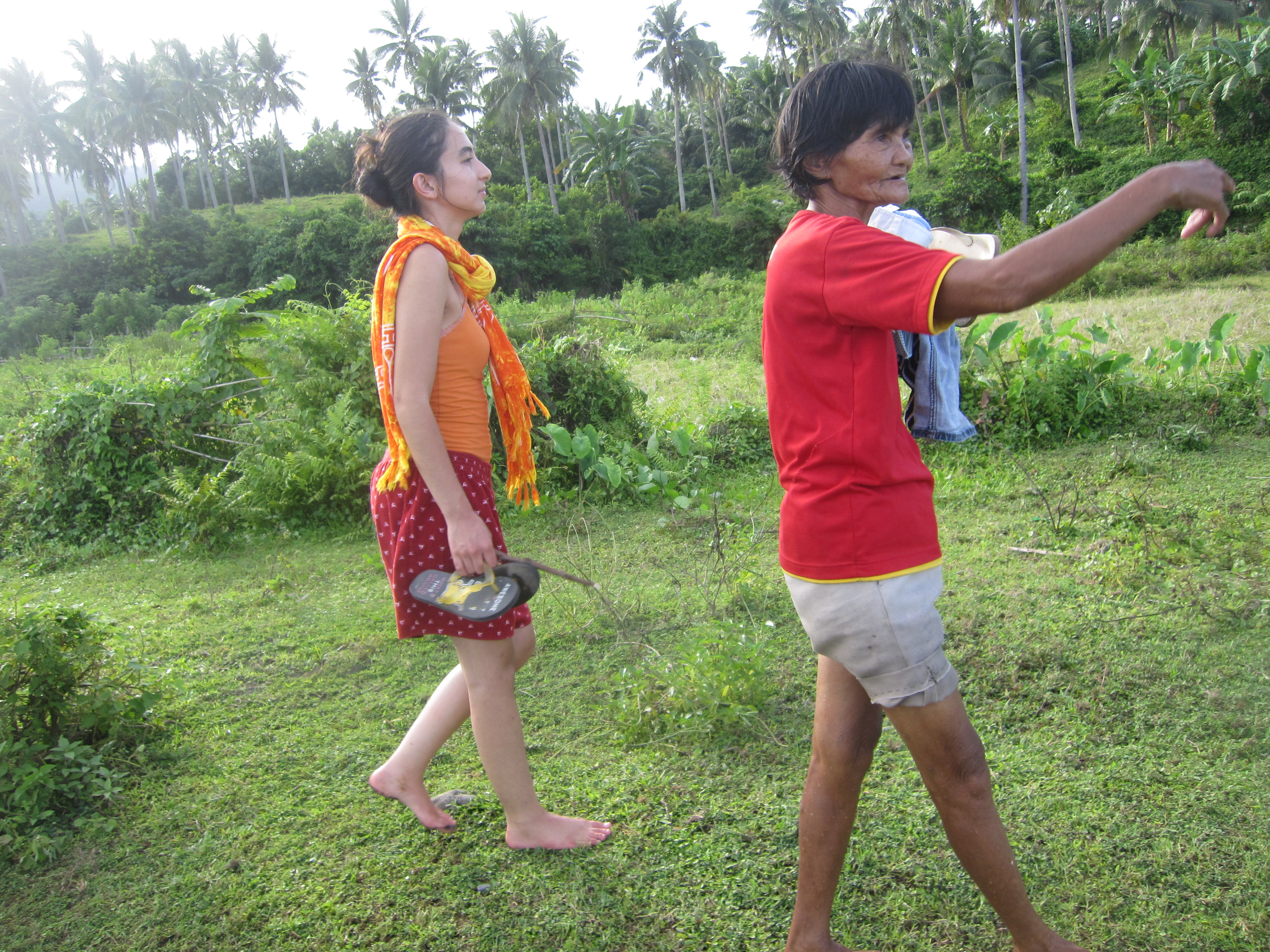
UCSB Undergraduate Student and Arnhold Scholar Vanna Laughlin conducting research in the Philippines, Summer 2018, Sponsored by The Global Latinidades Project
In the always politically charged context of racial politics in the US, many critics decry those who “came out” as Latinx only when they believed it might be politically expedient or financially beneficial to do so after years living as “white” people, and enjoying the benefits and privileges that accrued from their light skin and other phenotypal and cultural passings. There is no shortage of people who calculated that they "have nothing to lose"—and lots to gain—by declaring themselves to be Chicana, Chicano, Chicanx, Latinx, People of Color, and so on. Ironically, many spout ultra-nationalist discourses that oftentimes create caricatures of Latinx culture, in addition to engaging in contradictory virtue signaling and self-righteous "call-out culture" politics which stifle the very heartbeat of Latinidades: productive dissensus, ongoing dialogue, and constant synthesis.
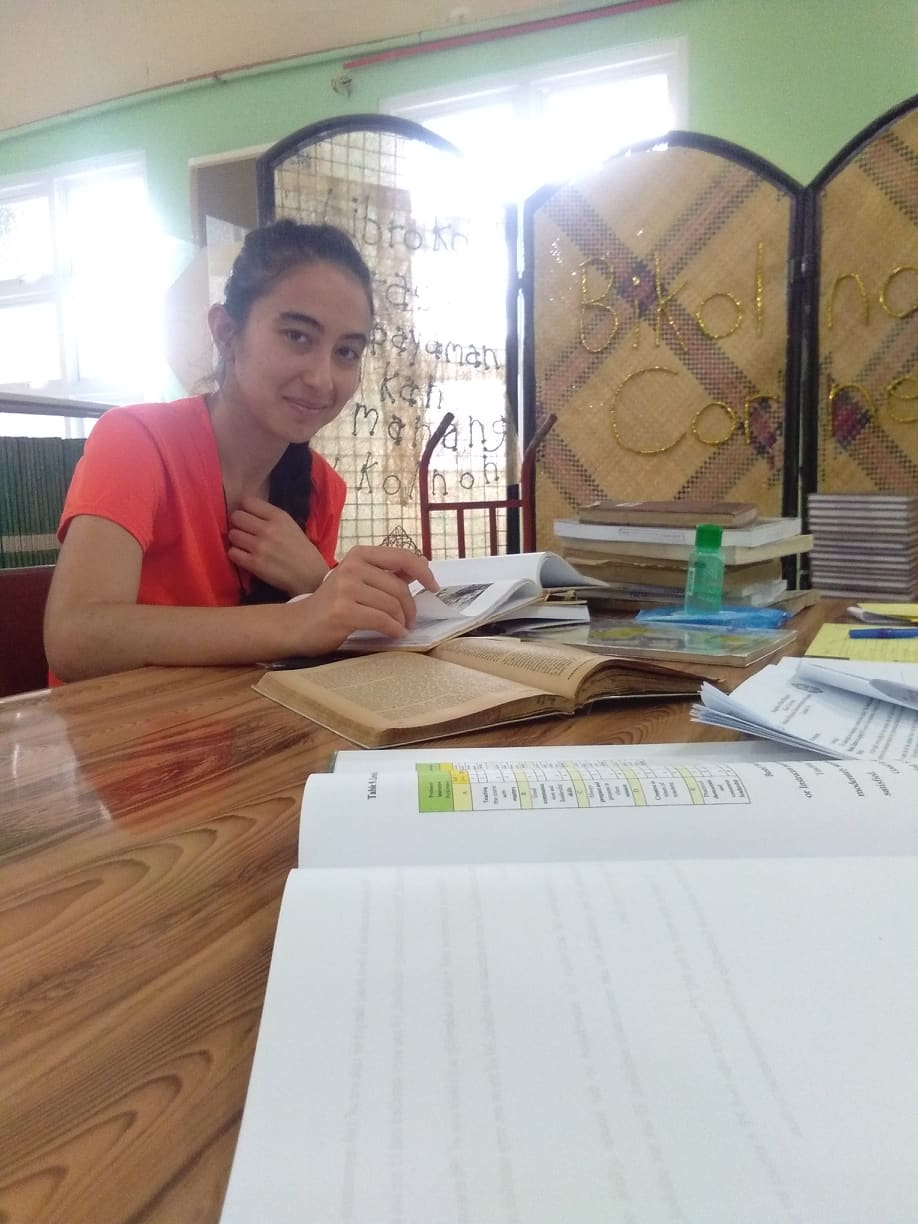
UCSB Undergraduate Student and Arnhold Scholar Vanna Laughlin Conducting Field Research in Philippines National Library 2018, Sponsored by The Global Latinidades Project
Importantly, in many cases the decision by non-Latinx people to identify as Latinx was not a self-interested decision, but an act of solidarity. Some non-Latinx people passing as Latinx actually were acculturated in barrios as Latinesque subjects, that is, self-acknowledged non-Latinx people who nonetheless were allies and supporters of Latinx people and their struggles, frequently living and working alongside them as community members. Author Daniel Lewis James—more famously known by the Spanish version of his name “Danny Santiago”—is perhaps the most famous of these figures. His 1983 novel about a Mexican American family in East Los Angeles, Famous All Over Town, helped inaugurate the category of Chicanesca and Latinesca literature: non-Latinx-authored texts that are recognized as sympathetic and more or less accurate. Chicanesca and Latinesca literature challenged stereotypical and racist depictions by non-community members, and by Latinx authors who traffic in essentialism and exoticism.
In some cases, people don’t know a famous person is not Latinx until after their death, such as H.G. “Hache” Carrillo, an African American born as Glenn Carroll who subsequently made a career as a novelist that involved them passing as an AfroCuban person
by birth. This was the main subject of their award-winning 2014 novel, Losing My Espanish, which continues to be recognized as a Latinx work by some even after the postmortem discovery of the author’s racial passing as Latinx. And there are, of course, numerous non-Latinx, as well as reinvented Latinx people claiming mastery of all things Latinx even as they frequently traffic in stereotypes and essentialist orthodoxies. Some of them even call themselves "Master," "Maestra," and "Maestro," oblivious to the hierarchical dimensions of this nomenclature. This includes well-known authors who dogmatically proclaim that Latinx people are inherently one thing or another, speak, write, and act in a specific way—and only in a specific way—and profess a preordained "radical" politics (with the term "radical" conveniently left vague and undefined thereby enabling them to always claim ownership of it).
But truth be told, Latinx is all of the above, none of it, and more—simultaneously! That is to say, there are a multiplicity of Latinidades, or Latinx modes of being, thinking, and doing. We do not need to agree about any of it. Significantly, even if it is hard to dismiss the many ways that different paradigms of Latinx identity are all frequently intersecting, it

UCSB Graduate Student Clinton Terrell attending Spanish Language emersion studies at La Gaurida Escuela Cooperativa de Español y Espacio Cultural in Oaxaca, Mexico, Summer 2021, Co-Sponsored by The Global Latinidades Project
perhaps might be even more important to note how these intersecting paradigms also diverge in ways far more significant than their brief moments of intersection. This is a point made by Sandra "Sandy" Soto in her incisive study, Reading Chican@ Like a Queer: The Demastery of Desire (2010). It is very important to recognize that Latinx implies differences within the difference signaled by the (more or less) racialized, gendered, sexualized category of Latinx. There is no uniformity even as there is coherence for each subjectivity and, of course, recognizable affinity groups of all sorts: urban Latinx punk rockers and Hispanic Republicans; Salvadoran American American gay professors and Puerto Rican socialist congresspersons; hyperlocal Chicano Cholos and Latinx communist internationalists living (and sometimes dying) abroad in the revolutionary pursuit of a world free of all national chauvinisms and oppressions. And to be sure there are many more dissonant permutations within and beyond these pairings.
Latinx is Fundamentally Plural & Multivalent
Despite all these iterations and explications of the Latinx epistemological and ontological category, we still don’t have a precise definition…and we never will! We don’t need one, except as a temporary placeholder. Besides, such homogenizing terms are always autocratic and dangerous. Accordingly, meta-critical inquiry and interrogation are our central concerns in the Global Latinidades Project. The intellectual’s vocation, after all, is to ask questions, many questions, and ever more precise questions, that are occasioned by the localized complexities of the human situation, broader global realities, and the cosmic expansiveness of it all. And, moreover, as a great historian once noted, “The philosophers have only interpreted the world, in various ways. The point, however, is to change it.” Sometimes small, and on occasion, big answers and changes come from these inquiries. But even these require constant questioning anew to remain relevant to present realities and to avoid ossification. Technological breakthroughs, for instance, require intellectual vigilance attuned to the ethical dilemmas that accompany the creation of materials that can be weaponized. So, too, do discoveries about human culture, mind, and body, which historically have been deployed as violence against particular populations. Without continued questioning and sustained in-depth interrogation, we leave ourselves, and everyone and everything, vulnerable to harm with every new proclaimed “discovery.”
The Global Latinidades Project seeks to raise increasingly more insightful questions about an expansive range of Latinidades, or modalities of being, over time and place. Our inquiry is multifaceted and predicated upon a series of questions about the fields of Latinx Studies, and Ethnic Studies in general, as well as related Area Studies—Latin American, African and Black Diasporic, Middle Eastern and Mediterranean, Pan-Asia and Pacific Islands, and more. In fact, the Global Latinidades Project seeks to explore the underexamined areas of Latinidades that are at the intersections between Ethnic and Area Studies, and also beyond them in dialogue with Global Studies. A little-known observation by the great Chicanx lesbian theorist Gloria Anzaldúa proposes that “we hardly ever own our Black ancestry.” This is true, particularly among Chicanx people until rather recently. We also know from historical accounts of the European-Amerindian contact that mestizaje was not just
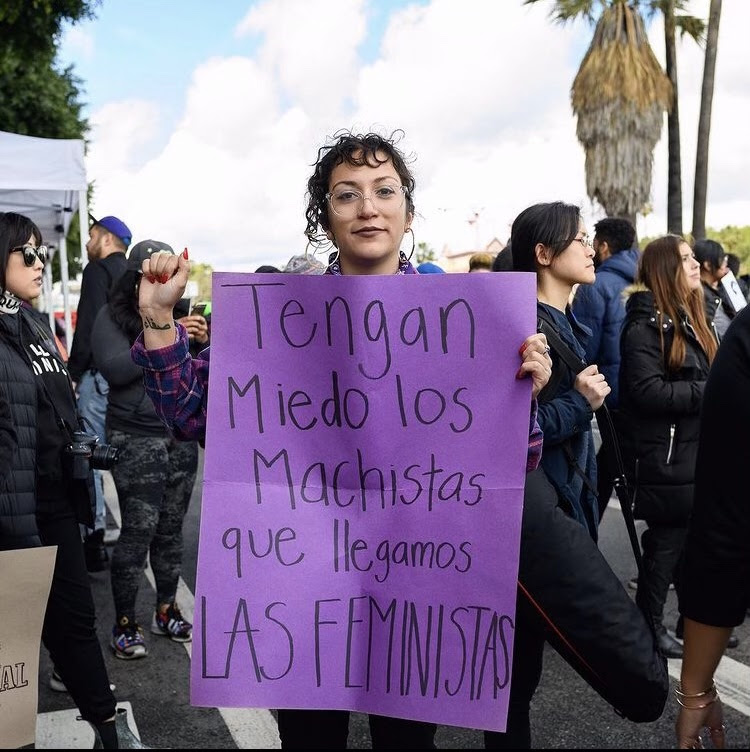
Cristina Awadalla during participant observer field work at the Women's March in Los Angeles, 2020, Co-Sponsored by The Global Latinidades Project
the biological and cultural product of a tumultuous European-Indigenous encounter, but also included Asian, South Asian, African, and Mediterranean sailors of various religious heritages, such that the very definition of mestizaje as merely a European Christian and Mesoamerican indigenous fusion continues to be radically incomplete. Subsequent generations of intermixing, as well as the outward flow of Latinx expatriates to parts of Asia, Africa, Europe, and elsewhere, in wartime and over time in general, have added to the myriad ways that Latinx people have always been global even if this has not always been recognized, much less thoroughly researched and theorized in the field of Latinx Studies, or allied Ethnic Studies and Areas Studies.
While Caribbean-based Latinx Studies, primarily in the US East Coast, have always included Black Studies as part of its epistemology, Chicanx Studies has only recently began exploring the Black roots of Chicanx identity. The Son Jarocho Movement is an exciting conjunctural moment for the field as youth and elders unite to recover Black rhythms and genealogies in Mexican folk music, culture, and identity. This movement anticipated the traveling museum exhibit, “The African Presence in México: From Yanga to the Present,” which opened in 2009 and traveled throughout the world. The fact that the first Maroon—formerly enslaved Black—settlement was founded in Mexico should transform everything we do in Chicanx Studies! Accordingly, the Global Latinidades Project has inaugurated the AfroLatinidades Institute as a unique and central component of the Global Latinidades Project. This institute includes a research cluster involving students and faculty, and also a unique collaboration with three Historically Black Colleges and Universities for an advanced student mentoring and summer research program designed to increase the number of Black students in UC graduate research programs.
The Black roots of Mexicanidad, along other globally-resonating histories and developments, pose exciting opportunities to keep exploring what Latinx people have been, who they are, and how they are constantly becoming something new and renewed. For instance, Latinx Muslims are the fastest-growing segment of the Muslim population in the US; Punjabi Mexican Americans of Muslim, Buddhist, and Sikh faiths have been established in central California since the early twentieth century, and continue to be a vibrant transversal community; and broader LatinAsian subjectivities are longstanding in many parts of Latin America, as well as in US barrios! And as noted, even as Chicanx and Latinx Studies is expanding to include Central American Studies, newer immigrant, first, and even second generations of Mixtec and Zapotec communities in the US add a layered range of indigenous ethnic and racial as well as language complexities that pressure extant analytical frameworks and solidarity infrastructures in Latinx Studies.
A Productive Critical Dissensus
Adding to the pressures on Latinx Studies as currently configured, the field has become increasingly institutionalized and professionalized, and this has allowed various orthodoxies and hierarchies to creep into the field. As a result of this petite bourgeois turn in Latinx Studies, lingering affinities between and among Latinx working class and underclass populations—the overwhelming majority of Latinx people—with non-Latinx people in their same class strata ultimately challenge the prominence of racial prisms as the exclusive heuristic for examining Latinx life, culture, identity, and politics. Sometimes a Latinx urban worker who wields a hammer for a living, or rural farmworker who earns their pay with a sickle, may have more in common with workers of different races in their same occupation and class strata than they may have in common with members of the Latinx middle and upper classes. These cross-racial intersections range from the local to the global, and invite revolutionary reassessments—from below—of what Latinidades can be and do.
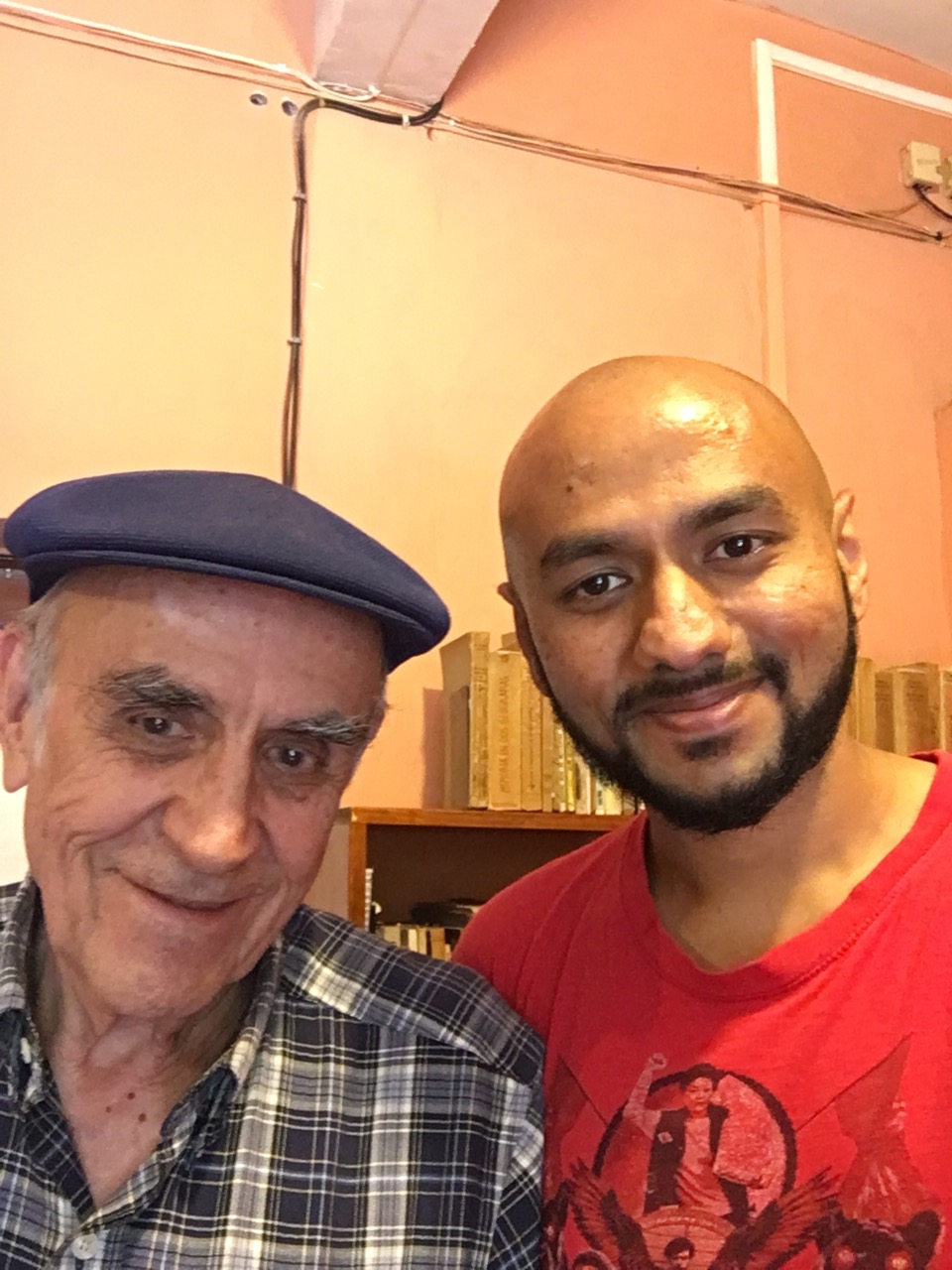
Deprofessionalized Grassroots Intellectual Gustavo Esteva with UCSB Graduate Student Pratik Raghu, Co-Sponsored by The Global Latinidades Project, at la Universidad de la Tierra, Oaxaca, Mexico, 2021.
The Global Latinidades Project, then, is both part and parcel of Latinx Studies, but also Latin American Studies, as well as intersecting Ethnic and Area Studies, always Gender and Sexuality Studies, and also is especially cognizant of the vicissitudes of class and consciousness, and especially ideology, power, and the inconsistent nature of counter-power. As such the work being promoted and undertaken through The Global Latinidades Project is US-based in its attention to US-born or raised Latinx people; but it is not just US-based, as these subjects have always been unruly subjects, residents, sojourners, and travelers, and through it all, transformers of themselves and the societies within which they find themselves at a given moment in time and place inside and outside the US,
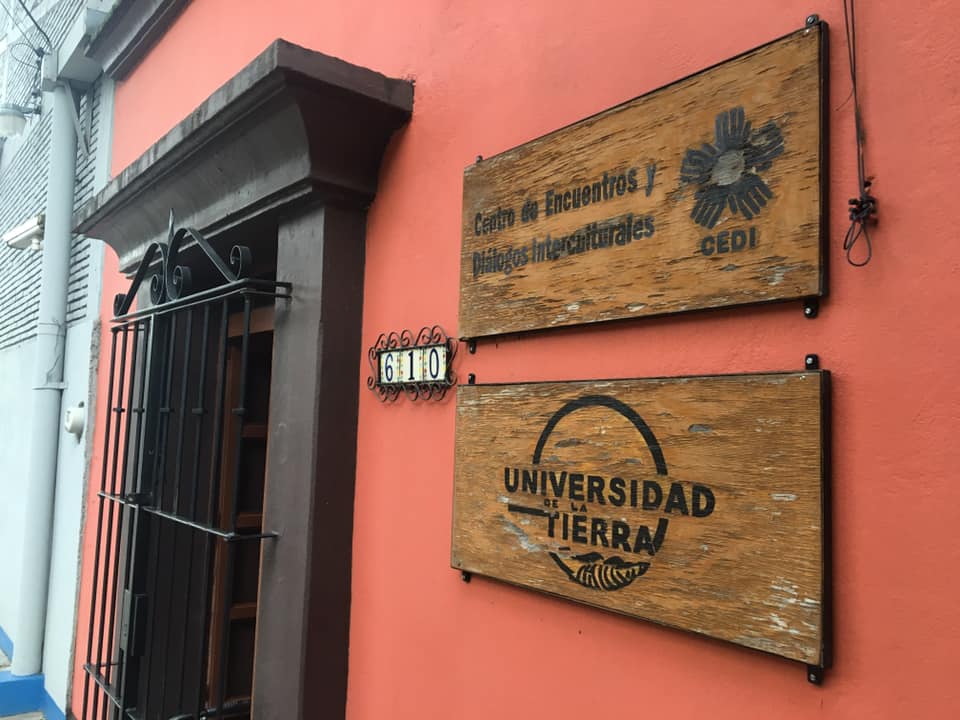
La Universidad de la Tierra, Oaxaca, Mexico, site of the 2022 Conviviality Theory and Praxis Workshop for Community Organizers, Co-Sponsored by The Global Latinidades Project.
and the liminal and peripheral spaces between and beyond. Equally important, the work of the Global Latinidades Project is not just university based. The Global Latinidades Project is a research center housed in the English Department at the University of California at Santa Barbara; but it also bridges the town-gown divide in many ways, globally and locally. For instance, the Global Latinidades Project has formed partnerships with multiple institutions, initiatives, and communities—from international universities to local barrio community centers. These include El Centro Santa Barbara in Santa Barbara's west side barrio; Santa Barbara County Immigrant Legal Defense Center; and the Center for Convivial Research and Autonomy based in multiple locations in Spain, California, and Oaxaca, Mexico. Furthermore, the advisory board includes student and faculty scholar-activists from intersecting fields: Chicanx, Central American, and Pan-Latinx Studies; Asian American Studies; African American Studies; Native American and Indigenous Studies; LGBTQI+ Studies and Queer of Color Critique; as well as Critical Institution, Latin American, Postcolonial, Decolonial, and Global Studies.
Significantly, the Global Latinidades Project has received a $1.8 million multi-year grant to extend this Latinx Studies globalization initiative to create a five-campus Global Latinidades Consortium that includes four additional University of California Campuses, each of which is pursuing a unique trajectory towards exploring the interstices between Latin American Studies and Latinx Studies, and the spaces beyond in dialogue with Global Studies. As Principal Investigator I am pursuing and supporting research on internationalized paradigms of Latinidades and intersecting identity formations that extend through and beyond cultural nationalisms and the nation-state. Co-Principal Investigator Arturo Arias at UC Merced is pursuing a critical Mesoamerican and global indigenous studies agenda that links with the contemporary flow of indigenous migrants, and establishment of new multi-generational indigenous Latinx communities in the US. Co-Principal Investigator Cecilia Rivas at UC Santa Cruz is developing her campus as a hub for Central American American Studies in the UC System. Co-Principal Investigator Ricky Rodriguez at UC Riverside is expanding transnational critical popular musicology, media, and cultural studies with partnerships in underclass contexts in Scotland and US barrios. Co-Principal Investigator Ofelia Cuevas at UC Davis is interweaving critical prison studies and revolutionary social movements with the renowned Taller Arte Nuevo Amanacer community arts center through a series of collaborative activities that involve local and international artist, scholar, and activist collaborations.
The UCSB portion of this multi-campus initiative includes collaborations with multiple centers on the UCSB campus for various programs and activities. These UCSB initiatives include the Voces Nuevas Latinx Author
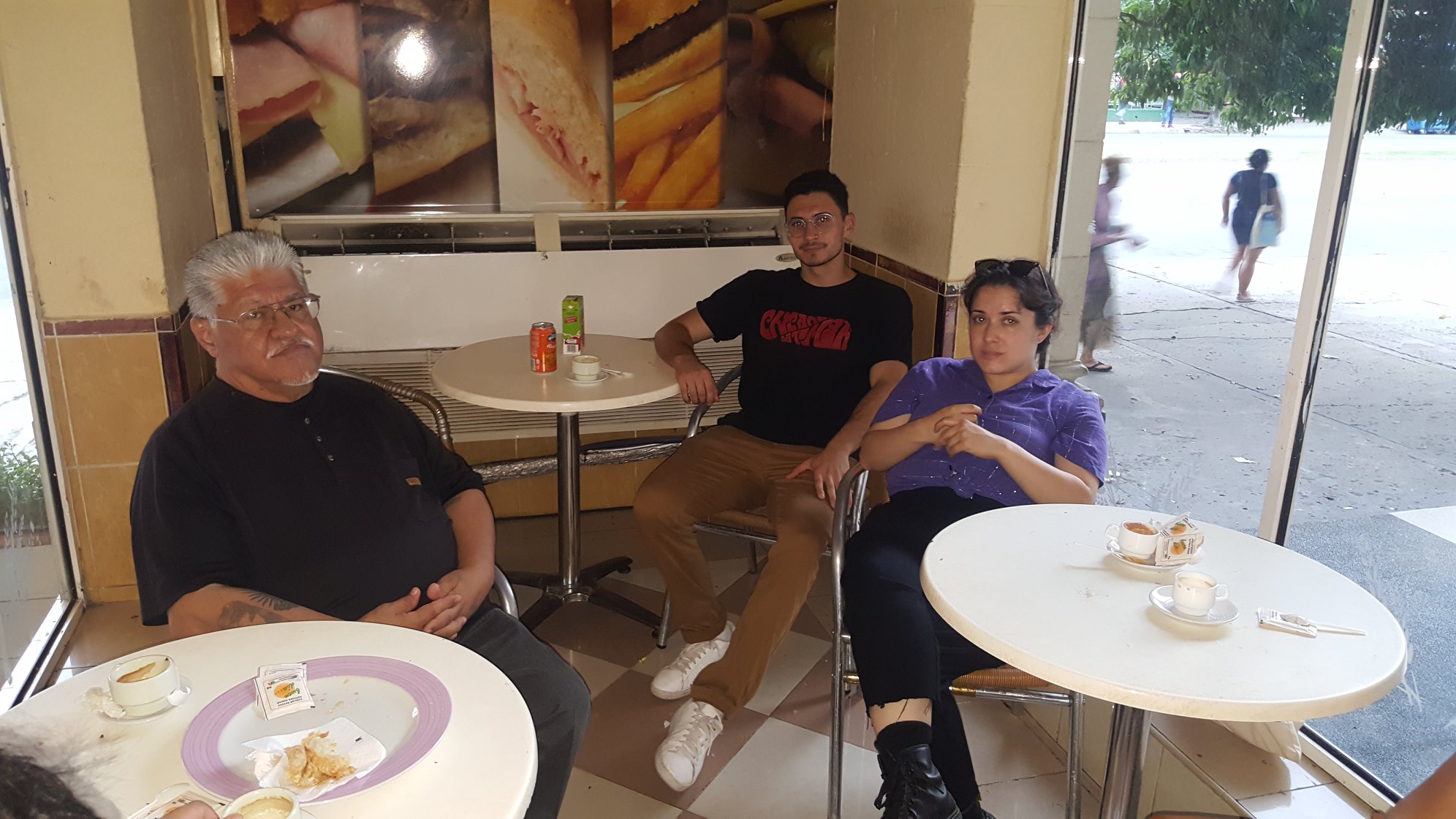
Author Luis Rodriguez with UCSB Students in Cuba, 2019, Co-Sponsored by The Global Latinidades Project
Series, funded by the National Endowment for the Arts and Co-Sponsored by the UCSB Interdisciplinary Humanities Center. Also, the Global Latinidades Project’s aforementioned AfroLatinidades institute has received external funding of $485,000 (with additional cost-sharing by endowed chair resources from the Robert and Liisa Erickson Presidential Chair in English) to facilitate a partnership with three Historically Black Colleges and Universities—Spelman College, Morehouse College, and Texas Southern University—for a three-year research-intensive program designed as a recruitment pathway for increasing the number of Black students in graduate research programs throughout the University of California’s campuses.
The Global Latinidades Project also includes international faculty associates in Mexico, Cuba, Spain, England, Poland, and Germany. One exciting project is an international anthology on the life and work of Chicanx author and activist Luis Rodriguez, In the Long Run: The Life and Legacy of Luis Rodriguez. This project is co-edited by myself and Josephine Metcalf, Director of the Critical Prison Studies Center at Hull University in England, and deliberately includes scholar and artist contributors from seven countries committed to broader American Studies in dialogue with related global contexts, and especially critical prison and gang studies. Other international projects include a double-dossier sequence in the journal Aztlán—The Global Latinidades: Transhemispheric Latinx Studies—which I am co-editing with UCSB Doctoral Candidate and Global Latinidades Project Advisory Board Member Roberto Macías, and UCSC Global Latinidades Consortium Co-Principal Investigator Cecilia Rivas for 2023-2024, with the goal of further expanding the global resonances of Chicanx and Latinx Studies.
The Global Latinidades Project pursues this collaborative supra-institutional agenda through additional initiatives, such as the Raza World Visions Radio Show on KCSB 91.9 FM in Santa Barbara, which airs Saturdays from 10:00 – 11:00 p.m., and the Raza Oral History and Videography Project, which already has produced three educational videos, with three more in production. The Barrio Internship Program also partners on collaborative activities, events,
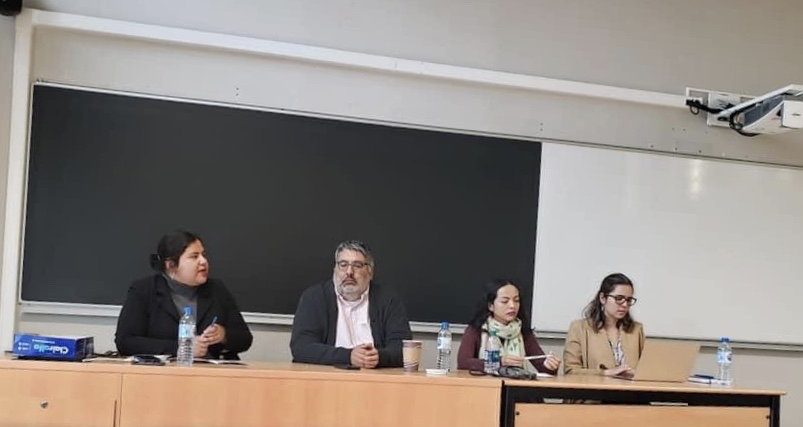
UCSB Graduate Students Presenting at The Anzaldúa Symposium in 2019, Paris, France, Sponsored by The Global Latinidades Project
and grants with the El Centro Santa Barbara, a grassroots democratically operated community center in Santa Barbara’s West Side Barrio. We also collaborate and fund an internship with the Santa Barbara County Immigrant Legal Defense Center in its mission to provide pro bono counseling and legal services for immigrants, migrants, and residents facing deportation.
It bears noting that within the effort to merge the local with the global, the Global Latinidades Project is, fundamentally, a student-centered initiative. Through College of Arts and Sciences and Graduate Division Dean support, as well as funding by the Robert and Liisa Erickson Presidential Chair in English established by a generous donation by UCSB English Department alumni John Arnhold and the Arnhold Foundation with matching funds by the UC Regents, we have created a Proseminar on Scholarships, Fellowships, and Grants to assist undergraduate and graduate students in cultivating unique professional profiles, sophisticated and well-theorized research projects, and job and internship applications designed to facilitate their success in the academy and in their future careers. This involves incisive instruction on strategies and tactics for winning grant, fellowship, and scholarship applications. The results have been astounding: from 2017 to 2021, students in the five iterations of the annual Proseminar have applied for $7.2 million in awards and have received approximately $1 million in awards from the Ford Foundation, UC President’s Postdoctoral Fellowship, and many more foundations, institutions, agencies, and programs.
The Proseminar is part of a broader initiative—The Global Latinidades Project's Collaborative Pedagogy and Praxis Workshops—that involve collaborations with multiple institutions throughout the US and Mexico. The 2022 Spring & Summer Conviviality Theory and Praxis Workshop for Community Organizers involves collaborations with multiple institutions throughout the US, Mexico, and Spain. With facilitators from the transhemispheric grassroots Center for Convivial Research and Autonomy based in Oaxaca and San José, California, we are developing a workshop on collaborative learning, lateral problem solving, and collective action. The workshop is designed for student organizers engaged in union organizing, anti-carceral activism, barrio grassroots organizational activities, and alternative grassroots political and economic organizations. The workshop is group organized, led by graduate and undergraduate students at several institutions, as well as community-based organizers. It includes three phases: 1) preparatory planning and development of workshop principles and praxis; 2) virtual multi-institutional dialogues during spring 2022; and 3) in-person summer workshop with Center for Convivial Research and Autonomy facilitators at La Universidad de la Tierra in Oaxaca, Mexico. This initiative is interwoven with ongoing community organizing efforts in addition to upcoming undergraduate and graduate course at UCSB, Art and Revolution: Comparative Studies in the Theory and Praxis of Revolutionary Art and Culture (Winter 2023).
The Global Latinidades Project also provides multiple types of funding for students and scholars: international conference and symposia travel; special national and international colloquia tuition; archival research grants-in-aid; as well as book and materials stipends. Pursuant to the goal of theorizing the global resonances of their localized research, student researchers have received Global Latinidades Project support for archival and fieldwork throughout the US, Mexico, England, India, Spain, France, Cuba, Philippines, Peru, and elsewhere. We also provide numerous student research-based employment opportunities: Student Assistantships, Teaching Assistantships, Graduate Student Researcher, Community Internships, Grant Writer Assistant, and Special Project Assistant at quarter and half-time appointments. From 2017-2022, the Global Latinidades has provided over 75 quarters of employment, and this includes 50% Teaching Assistantships as well as 50% Graduate Student Researcher IV, Step 8 positions, with tuition and fee remission, to facilitate dissertation completion alongside mentoring and assistance on The Global Latinidades Project.
In summary, The Global Latinidades Project is committed to providing support for on-the-ground activities today, while continuing to explore the plurality of Latinidades, especially the neglected and undertheorized aspects, which we might more accurately call supra-Latinidades, and in some cases Post-Latinidades, as they exist within and also beyond extant populations and paradigms. In so doing, we seek to question all that we thought we knew about Latinx history, culture, and politics pursuant to ever more complex understandings of the diversity within the diversity of Latinidades, and the next necessary syntheses in an ongoing, permanent revolution of thought, habitus, and direct action locally and globally.
We invite everyone to join in this effort to further globalize the field of Latinx Studies that lies in the interstitial spaces between Ethnic Studies and Area Studies, academics and community-based intellectual and political work, and more broadly, at the nexus of the ongoing epic struggle to imagine and actualize an egalitarian world for all humans and sentient beings that is in harmony with the earth and the cosmos.
Hence, our motto: Mapping Latinx Life and Culture Worldwide. We look forward to working with you, alongside you, as equals.
In Solidarity,
Ben
© Ben Valdez Olguín, 2022
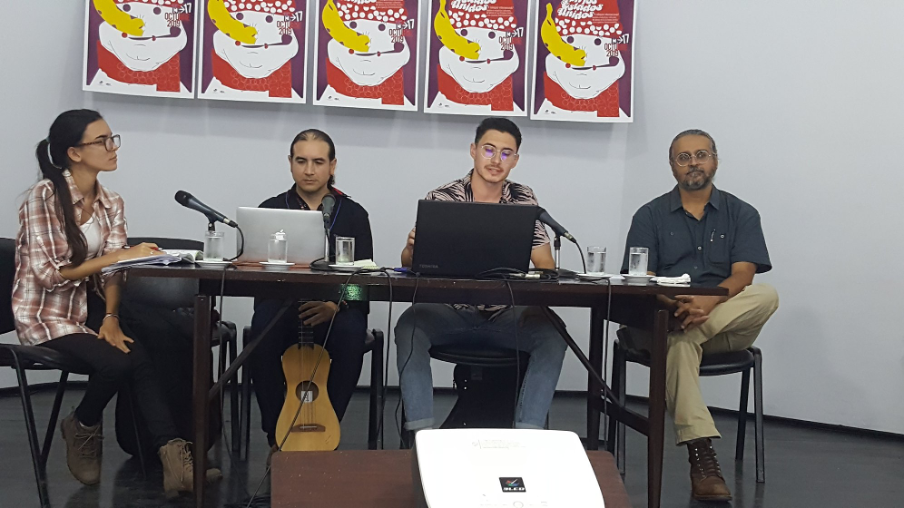
Global Latinidades Panel at 5th International Colloquium on Latinos in the United States, Casa de Las Américas, Havana, Cuba, October 2019. Panel Sponsored by the Global Latinidades Project.

